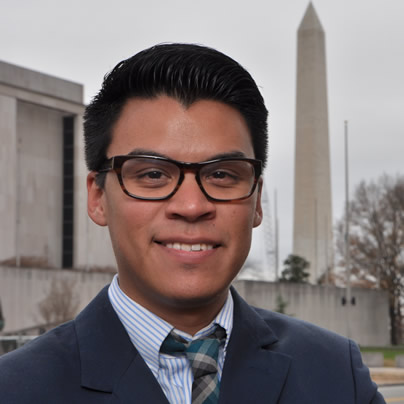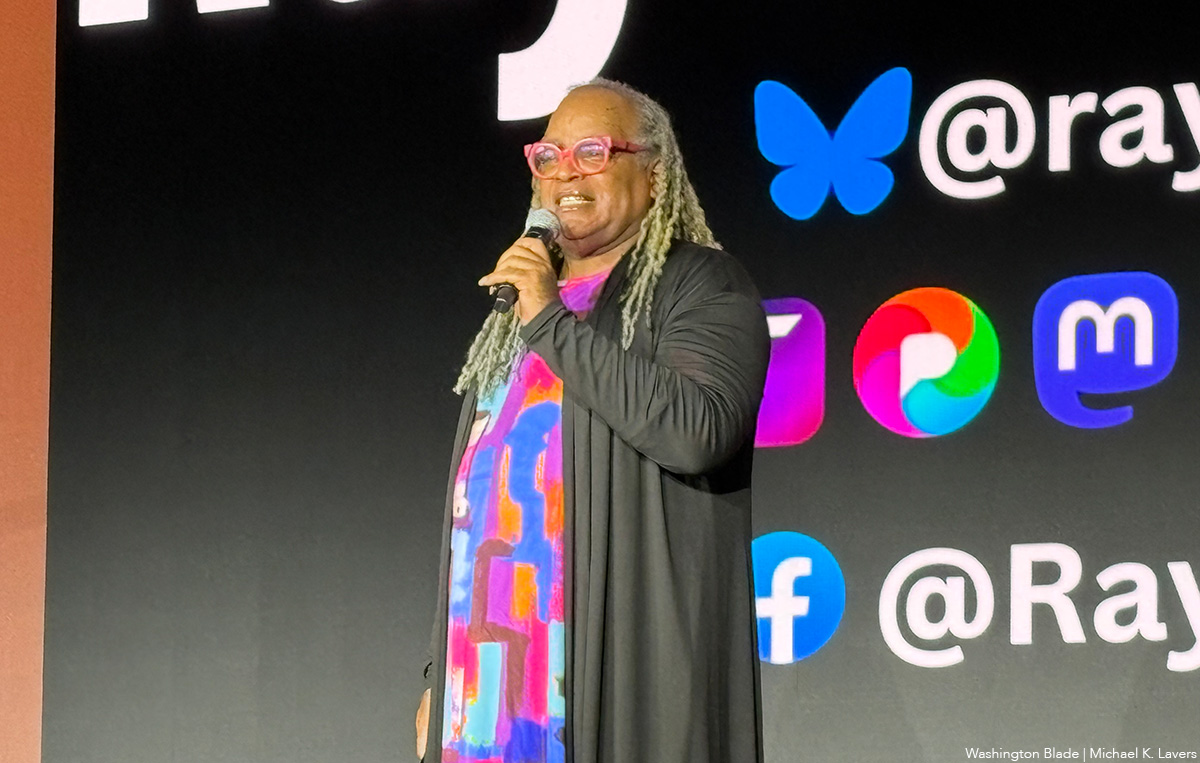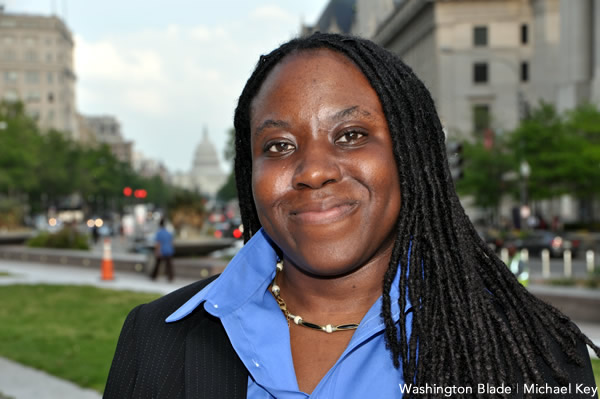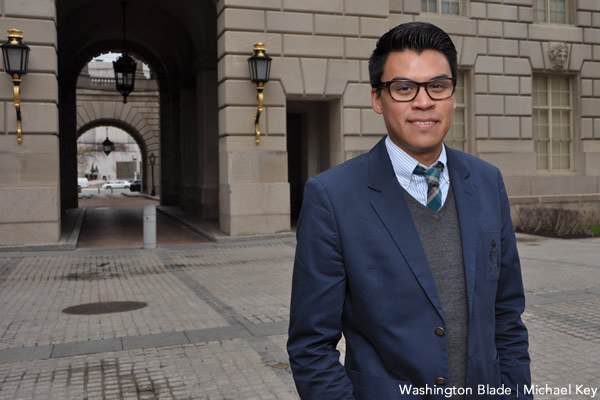Local
Stein Club election challenged by losing faction
Outgoing officers call special meeting to consider invalidating victory by new members

The officers of the Gertrude Stein Democratic Club announced on Wednesday that the club will hold a special membership meeting on Dec. 19 to consider invalidating its Dec. 3 election in which three new members won three of the club’s five officer positions.
In a development that stunned many of the club’s longtime members, at least 46 mostly young LGBT activists who joined the club less than a week prior to the election appeared to have lined up enough votes to defeat Stein President Lateefah Williams and her two vice presidential running mates, seemingly gaining control of the club.
But this week, several unidentified club members came forward to challenge the election of the three new officers on grounds that the home address for 11 of the new members who voted in the election couldn’t be confirmed, according to a memorandum prepared by an attorney advising the club on the challenges.
The memorandum by Donald R. Dinan, general counsel to the D.C. Democratic State Committee, says the club also could not verify whether another six of the new members qualified for a special membership category under which they joined at a discounted membership fee of $15. The regular membership fee is $35.
Under the club’s bylaws, the special membership is restricted to “senior citizens, students and limited income” members.
“Providing an incorrect or false address would be grounds for disqualifying a voter,” Dinan states in his memo. “Likewise, if one were to misrepresent their status in order to qualify for Special Membership and pay the lower dues, that representation could likewise disqualify the voter.”
Dinan added, “In this case, the number of questionable votes is greater than the margin of victory in each of the three races.”
The challenge to the election comes after a number of longtime Stein Club members expressed outrage that a group of newcomers, most of whom had never attended a club meeting, managed to wrest control of the club from its established officers and members.
Supporters of the new crop of members point out that the club’s rules and bylaws do not prevent people from joining the club immediately prior to an election of officers.
The new members were led by gay political consultant Martin Garcia, 27, who defeated Williams for the club’s presidency by a vote of 47 to 45. Garcia is an account manager for the D.C. based political consulting firm The Campaign Workshop. He worked for three years on election campaigns for the Gay and Lesbian Victory Fund prior to starting his current job in January.
Angela Peoples, 26, a policy analyst for the U.S. Consumer Financial Protection Bureau, beat club backed candidate Jon Mandel, a staff assistant to D.C. Council member Kenyan McDuffie (D-Ward 5), by a vote of 47 to 44. The two competed for the post of vice president for legislative and political affairs.
Vincent Villano, 26, communications director for the National Center for Transgender Equality, defeated club backed candidate Hassan Naveed, a public relations firm staffer and vice chair of Gays and Lesbians Opposing Violence, by a vote of 48 to 41. If he withstands the election challenge, Villano would become the club’s vice president for administration.
“We are disappointed that the Stein leadership intends to challenge new members who want to contribute to Stein’s growth,” Garcia said in a statement released Wednesday night.
“Stein’s membership rolls nearly doubled because of our recruitment efforts, and that’s a good thing,” he said.
“These new members are young people, people of color, and people from low-income backgrounds who were otherwise not engaged in Stein’s activities…We should be having a special meeting celebrating these new members, and finding ways to engage them.”
Villano said the Stein Club officers who called the special meeting with just a week’s notice appear to have violated the club’s bylaws, which require a two-week advance notice of a special meeting.
In a press release issued Wednesday, the club said its officers voted to call the special meeting to address the challenges to the election “brought by Stein Club members,” whom the release did not identify. The release said any officer whose election may be impacted by the special meeting did not vote on the question of whether the special meeting should be called. Williams, the club’s current president, is the only officer that could be affected by the special meeting.
The club’s current two vice presidents, Julius Agers and Jerome Hunt, did not run for re-election. The club’s treasurer, Barrie Daneker, and secretary, Jimmie Luthuli, were not challenged by the new members and won re-election unopposed.
Dinan said that because the club election was held by secret ballot there is no way of knowing how each member voted.
“Therefore, the number of voters whose addresses and/or Special membership status cannot be confirmed substantially affected the outcome of the election and would be grounds for invalidating the election,” Dinan states in his memo.
Dinan told the Blade in a telephone interview Wednesday night that his memo is not a fact-finding document and that it is the responsibility of the club and its members to determine whether the membership status and addresses of the new members in question are valid.
He said it is also up to the club to decide whether membership category and residential address issues are sufficient grounds for invalidating the election.
The club’s bylaws do not have a residency requirement, and supporters of the new officers say it should not matter whether the new members submitted their correct address on the membership application form.
Kurt Vorndran, a former Stein Club president, said he supports the decision by the officers to call the special meeting. But he said members participating in the meeting should be cautious about what action they take.
“Many club members are unhappy about the way the slate won the election,” he said. “But the question before the special meeting will be if any rules of the club were broken, not about what we think of the election tactics of one side.”
The special meeting is scheduled to take place Wednesday, Dec. 19, at 7 p.m. in Room 120 of the John A. Wilson Building at 14th Street and Pennsylvania Ave., N.W.
Ward 8 gay Democratic activist and longtime Stein Club member Phil Pannell, who supported Garcia’s bid for the club presidency, said the club’s bylaws and rules don’t define or provide a process for determining whether a member qualifies for a low-income membership.
“Never in the history of the club has a member’s claim to be low income been questioned,” Pannell said. “If this isn’t handled right it could lead to the destruction of the club.”
Virginia
McPike wins special election for Va. House of Delegates
Gay Alexandria City Council member becomes 8th LGBTQ member of legislature

Gay Alexandria City Council member Kirk McPike emerged as the decisive winner in a Feb. 10 special election for a seat in the Virginia House of Delegates representing Alexandria.
McPike, a Democrat, received 81.5 percent of the vote in his race against Republican Mason Butler, according to the local publication ALX Now.
He first won election to the Alexandria Council in 2021. He will be filling the House of Delegates seat being vacated by Del. Elizabeth Bennett-Parker (D-Alexandria), who won in another Feb. 10 special election for the Virginia State Senate seat being vacated by gay Sen. Adam Ebbin (D-Alexandria).
Ebbin is resigning from his Senate next week to take a position with Virginia Gov. Abigail Spanberger’s administration.
Upon taking his 5th District seat in the House of Delegate, McPike will become the eighth out LGBTQ member of the Virginia General Assembly. Among those he will be joining is Sen. Danica Roem (D-Manassas), who became the Virginia Legislature’s first transgender member when she won election to the House of Delegates in 2017 before being elected to the Senate in 2023.
“I look forward to continuing to work to address our housing crisis, the challenge of climate change, and the damaging impacts of the Trump administration on the immigrant families, LGBTQ+ Virginians, and federal employees who call Alexandria home,” McPike said in a statement after winning the Democratic nomination for the seat in a special primary held on Jan. 20.
McPike, a longtime LGBTQ rights advocate, has served for the past 13 years as chief of staff for gay U.S. Rep. Mark Takano (D-Calif.) and has remained in that position during his tenure on the Alexandria Council. He said he will resign from that position before taking office in the House of Delegates.
Local
Local LGBTQ groups, activists to commemorate Black History Month
Rayceen Pendarvis to moderate Dupont Underground panel on Sunday

LGBTQ groups in D.C. and elsewhere plan to use Black History Month as an opportunity to commemorate and celebrate Black lives and experiences.
Team Rayceen Productions has no specific events planned, but co-founder Rayceen Pendarvis will attend many functions around D.C. this month.
Pendarvis, a longtime voice in the LGBTQ community in D.C. moderated a panel at Dupont Underground on Feb. 8. The event, “Every (Body) Wants to Be a Showgirl,” will feature art from Black burlesque artists from around the country. Pendarvis on Feb. 23 will attend the showing of multimedia play at the Lincoln Theatre that commemorates the life of James Baldwin.
Equality Virginia plans to prioritize Black voices through a weekly online series, and community-based story telling. The online digital series will center Black LGBTQ voices, specifically trailblazers and activists, and contemporary Black queer and transgender people.
Narissa Rahaman, Equality Virginia’s executive director, stressed the importance of the Black queer community to the overall Pride movement, and said “Equality Virginia is proud to center those voices in our work this month and beyond.”
The Capital Pride Alliance, which hosts Pride events in D.C., has an alliance with the Center for Black Equity, which brings Black Pride to D.C. over Memorial Day weekend. The National LGBTQ Task Force has no specific Black History Month events planned, but plans to participate in online collaborations.
Cathy Renna, the Task Force’s director of communications, told the Washington Blade the organization remains committed to uplifting Black voices. “Our priority is keeping this at the forefront everyday,” she said.
The D.C. LGBTQ+ Community Center is also hosting a series of Black History Month events.
The D.C. Public Library earlier this year launched “Freedom and Resistance,” an exhibition that celebrates Black History Month and Martin Luther King Jr. It will remain on display until the middle of March at the Martin Luther King Jr. Memorial Library at 901 G St., N.W.
District of Columbia
U.S. Attorney’s Office drops hate crime charge in anti-gay assault
Case remains under investigation and ‘further charges’ could come

D.C. police announced on Feb. 9 that they had arrested two days earlier on Feb. 7 a Germantown, Md., man on a charge of simple assault with a hate crime designation after the man allegedly assaulted a gay man at 14th and Q Streets, N.W., while using “homophobic slurs.”
But D.C. Superior Court records show that prosecutors with the Office of the U.S. Attorney for D.C., which prosecutes D.C. violent crime cases, charged the arrested man only with simple assault without a hate crime designation.
In response to a request by the Washington Blade for the reason why the hate crime designation was dropped, a spokesperson for the U.S. Attorney’s office provided this response: “We continue to investigate this matter and make no mistake: should the evidence call for further charges, we will not hesitate to charge them.”
In a statement announcing the arrest in this case, D.C. police stated, “On Saturday, February 7, 2026, at approximately 7:45 p.m. the victim and suspect were in the 1500 block of 14th Street, Northwest. The suspect requested a ‘high five’ from the victim. The victim declined and continued walking,” the statement says.
“The suspect assaulted the victim and used homophobic slurs,” the police statement continues. “The suspect was apprehended by responding officers.”
It adds that 26-year-old Dean Edmundson of Germantown, Md. “was arrested and charged with Simple Assault (Hate/Bias).” The statement also adds, “A designation as a hate crime by MPD does not mean that prosecutors will prosecute it as a hate crime.”
Under D.C.’s Bias Related Crime Act of 1989, penalties for crimes motivated by prejudice against individuals based on race, religion, sexual orientation, gender identity, disability, and homelessness can be enhanced by a court upon conviction by one and a half times greater than the penalty of the underlying crime.
Prosecutors in the past both in D.C. and other states have said they sometimes decide not to include a hate crime designation in assault cases if they don’t think the evidence is sufficient to obtain a conviction by a jury. In some instances, prosecutors have said they were concerned that a skeptical jury might decide to find a defendant not guilty of the underlying assault charge if they did not believe a motive of hate was involved.
A more detailed arrest affidavit filed by D.C. police in Superior Court appears to support the charge of a hate crime designation.
“The victim stated that they refused to High-Five Defendant Edmondson, which, upon that happening, Defendant Edmondson started walking behind both the victim and witness, calling the victim, “bald, ugly, and gay,” the arrest affidavit states.
“The victim stated that upon being called that, Defendant Edmundson pushed the victim with both hands, shoving them, causing the victim to feel the force of the push,” the affidavit continues. “The victim stated that they felt offended and that they were also gay,” it says.
-

 Virginia4 days ago
Virginia4 days agoMcPike wins special election for Va. House of Delegates
-

 New York5 days ago
New York5 days agoN.Y. lawmaker vows ‘Pride flag will fly again’ at Stonewall Monument
-

 a&e features5 days ago
a&e features5 days agoMeet D.C.’s Most Eligible Queer Singles
-

 District of Columbia5 days ago
District of Columbia5 days agoU.S. Attorney’s Office drops hate crime charge in anti-gay assault





















